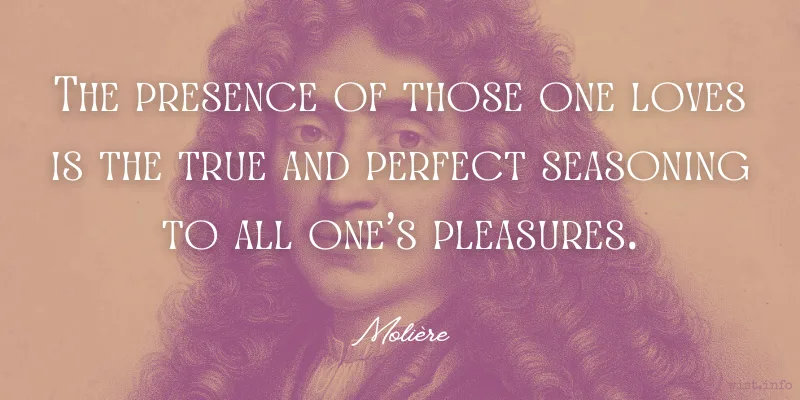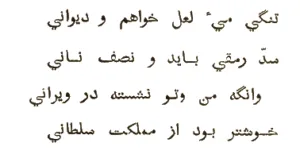Keep not ill men company, lest you increase the number.
George Herbert (1593-1633) Welsh priest, orator, poet.
Jacula Prudentum, or Outlandish Proverbs, Sentences, &c. (compiler), # 314 (1640 ed.)
(Source)
Quotations about:
company
Note not all quotations have been tagged, so Search may find additional quotes on this topic.
Keepe good men company, and you shall be of the number.
George Herbert (1593-1633) Welsh priest, orator, poet.
Jacula Prudentum, or Outlandish Proverbs, Sentences, &c. (compiler), # 120 (1640 ed.)
(Source)
The art of conversation, or the qualification for a good companion, is a certain self-control, which now holds the subject, now lets it go, with a respect for the emergencies of the moment.
Ralph Waldo Emerson (1803-1882) American essayist, lecturer, poet
Journal (1854)
(Source)
Reprinted in Journals of Ralph Waldo Emerson, 1820–1872, Vol. 3 (1912).
Serious artist or weekend amateur, it’s more fun cooking for company in company.
Julia Child (1912-2004) American chef and writer
Julia Child & More Company, Introduction (1979)
(Source)
Cry with me;
for sharing tears with others is relief in hardship.[συνάλγησον, ὡς ὁ κάμνων
δακρύων μεταδοὺς ἔχει
χουφότητα μόχϑων.]Euripides (485?-406? BC) Greek tragic dramatist
Andromeda [Ανδρομέδα], frag. 119 (TGF) (412 BC)
(Source)
Nauck frag. 119, Barnes frag. 51, Musgrave frag. 22. (Source (Greek)). Alternate translation.Come, let us weep together; for the unhappy
Find social tears their poignant griefs assuage.
[tr. Wodhull (1809)]
The company of just and righteous men is better
than wealth and a rich estate.[κρεῖσσον δὲ πλούτου καὶ βαϑυσπόρου χϑονὸς
ἀνδρῶν δικαίων χἀγαϑῶν ὁμιλίαι]
One person by himself is not a complete human being.
Northrop Frye (1912-1991) Canadian literary critic and literary theorist
The Educated Imagination, Talk 1 “The Motive for Metaphor” (1963)
(Source)
there are worse things than
being alone
but it often takes decades
to realize this
and most often
when you do
it’s too late
and there’s nothing worse
than
too late.Charles Bukowski (1920-1994) German-American author, poet
“Oh Yes,” You Get So Alone At Times That It Just Makes Sense (1986)
(Source)
More businesses die of indigestion than starvation.
David Packard (1912-1996) American electrical engineer, businessman, government official
(Misattributed)
The quote is frequently attributed to Packard, but actually he (anonymously) quoted in his book, The HP Way: How Bill Hewlett and I Built Our Company (1995): "Wells Fargo sent a retired engineer to visit us. I spent a full afternoon with him and I have remembered ever since some advice he gave me. He said that more businesses die of indigestion than starvation. I have observed the truth of that advice many times since then."
Variants of the saying include "entrepreneurs," "companies," and "start-ups" in place of "businesses." See here for more information.
A system must be managed. It will not manage itself. Left to themselves in the Western world, components become selfish, competitive, independent profit centres, and thus destroy the system. The secret is cooperation between components toward the aim of the organization. We can not afford the destructive effect of competition.
W. Edwards Deming (1900-1993) American management consultant, educator
The New Economics for Industry, Government, Education, ch. 3 “Introduction to a System” (1993)
(Source)
ACASTE: The presence of those one loves is the true and perfect seasoning to all one’s pleasures.
[C’est un merveilleux assaisonnement aux plaisirs qu’on goûte que la présence des gens qu’on aime.]
Molière (1622-1673) French playwright, actor [stage name for Jean-Baptiste Poquelin]
Le Misanthrope, Act 5, sc. 4 (1666) [tr. Wilbur (1954)]
(Source)
Reading a letter from Céliméne to Clitandre.
(Source (French)). Alternate translations:The presence of all those we love is an excellent relish to our pleasures.
[tr. Van Laun (1878)]The presence of people we love gives a wonderful relish to pleasures.
[tr. Mathew (1890)]It is a wonderful seasoning of all enjoyments to think of those we love.
[tr. Wormeley (1894)]The society fo those we love is a wonderful relish to our pleasure.
[tr. Waller (1903)]The presence of people we like gives a marvelous relish to our pleasures.
[tr. Page (1913)]The presence of people one is really fond of is the best seasoning for social amusements.
[tr. Bishop (1957)]A marvelous seasoning for the pleasures we enjoy is the presence of the persons we love.
[tr. Frame (1967)]
HENRY: Rather proclaim it, Westmoreland, through my host,
That he which hath no stomach to this fight,
Let him depart; his passport shall be made,
And crowns for convoy put into his purse:
We would not die in that man’s company,
That fears his fellowship to die with us.William Shakespeare (1564-1616) English dramatist and poet
Henry V, Act 4, sc. 3, l. 37ff (4.3.37-42) (1599)
(Source)
Sometimes, I feel discriminated against, but it does not make me angry. It merely astonishes me. How can any deny themselves the pleasure of my company? It is beyond me.
Zora Neale Hurston (1891-1960) American writer, folklorist, anthropologist
“How It Feels to Be Colored Me”, The World Tomorrow (May 1928)
(Source)
We can have no better clue to a man’s character than the company he keeps.
Niccolò Machiavelli (1469-1527) Italian politician, philosopher, political scientist
The Discourses on Livy, Book 3, ch. 34, § 2 (1517) [tr. Thomson (1883)]
(Source)
Alternate translations:One can have no greater indication of a man than the company that he keeps.
[tr. Mansfield / Tarcov (1996)]There can be no clearer indication about a man than the company he keeps.
[tr. Bondanella / Bondanella (1997)]
No one can be happy in eternal solitude.
Anne Brontë (1820-1849) British novelist, poet [pseud. Acton Bell]
The Tenant of Wildfell Hall, ch. 7 “The Excursion” [Helen] (1848)
(Source)
Be very circumspect in the choice of thy company. In the society of thine equals thou shalt enjoy more pleasure; in the society of thy superiors thou shalt find more profit. To be the best in the company is the way to grow worse. The best means to grow better is to be the worst there.
Good friends, good books, and a sleepy conscience: This is the ideal life.
Mark Twain (1835-1910) American writer [pseud. of Samuel Clemens]
Note (1898-07-04), Mark Twain’s Notebook, ch. 21 “In Vienna” (1935) [ed. Albert Bigelow Paine]
(Source)
Written while summering at a resort outside of Vienna. Paine notes, "Written in the Archduchess's album" (referring to Marie Theresa of Austria).
Good nature will always supply the absence of beauty; but beauty cannot supply the absence of good nature.
Joseph Addison (1672-1719) English essayist, poet, statesman
Essay (1712-02-06), The Spectator, No. 306
(Source)
Endeavor to make thy own Company pleasant to thee.
Thomas Fuller (1654-1734) English physician, preacher, aphorist, writer
Introductio ad Prudentiam, Vol. 1, # 99 (1725)
(Source)
The bonds that unite another person to ourself exist only in our mind. Memory as it grows fainter relaxes them, and notwithstanding the illusion by which we would fain be cheated and with which, out of love, friendship, politeness, deference, duty, we cheat other people and we exist alone. Man is the only creature that cannot emerge from himself, that knows his fellows only in himself; when he asserts the contrary he is lying.
Shared joyse are doubled; shared sorrows are halved.
Laugh and the world laughs with you,
Weep and you weep alone;
For the sad old earth must borrow its mirth,
But has trouble enough of its own.Ella Wheeler Wilcox (1850-1919) American author, poet, temperance advocate, spiritualist
Poem (1883-02-25), “Solitude,” ll. 1-4, New York Sun
(Source)
Possibly the most famous of Wilcox' works, these are the first four lines (the only ones anyone remembers) of three eight-line stanzas. Wilcox was paid $5 by the Sun.
Wilcox' original title was "The Way of the World," but the Sun editor changed it to "Solitude." She kept that new title when it was collected into Poems of Passion (1883).
If it’s heaven for climate, it’s hell for company.
J. M. Barrie (1860-1937) Scottish novelist and dramatist [James Matthew Barrie]
The Little Minister, ch. 3 “The Night-Watchers” [Jo Cruickshanks] (1891)
(Source)
A similar quote is cited to Mark Twain at about the same time. More research into this quotation can be found here: Heaven for the Climate, and Hell for the Company – Quote Investigator®.
He’d been an angel once. He hadn’t meant to Fall. He’d just hung around with the wrong people.
Terry Pratchett (1948-2015) English author
Good Omens, 2. “Eleven Years Ago” (1990) [with Neil Gaiman]
(Source)
Fellowship in woe doth woe assuage.
IMOGEN: Society is not comfort
To one not sociable.William Shakespeare (1564-1616) English dramatist and poet
Cymbeline, Act 4, sc. 2, l. 14ff (4.2.14-15) (1611)
(Source)
BISHOP OF ELY: The strawberry grows underneath the nettle.
William Shakespeare (1564-1616) English dramatist and poet
Henry V, Act 1, sc. 1, l. 63 (1.1.63) (1599)
(Source)
A Book of Verses underneath the Bough,
A Jug of Wine, a Loaf of Bread — and Thou
Beside me singing in the Wilderness —
Oh, Wilderness were Paradise enow.
Omar Khayyám (1048-1123) Persian poet, mathematician, philosopher, astronomer [عمر خیام]
Rubáiyát [رباعیات], Bod. # 149 [tr. FitzGerald, 3rd ed. (1872), # 12]
(Source)
Fitzgerald used the same translation for his 4th and 5th ed.
There are at least two close variants of this quatrain (Bodleian 149 and 153). Both introduce the wine, maybe the bread or meat, some verse, and a love interest. In the first variant, in some cases, the setting is in the wilderness which is turned to a virtual Paradise by the accoutrements; in the second case, the other factors turn the writer's mind away from Paradise itself. In the second variant, these items all brought together are valued more highly than the wealth of the Sultan. Some translators blend these together, others break them out in two (or three!) quatrains. While concordances (especially in the 19th Century) draw connections, they sometimes contradict. I have included them all here, for the reader to discern their own differences.
Alternate translations:Some ruby wine and a diwan of poems,
A crust of bread to keep the breath in one's body,
And thou and I alone in a desert, --
Were a lot beyond a Sultan's throne.
[tr. Cowell (1858), # 13]Here with a Loaf of Bread beneath the Bough,
A Flask of Wine, a Book of Verse -- and Thou
Beside me singing in the Wilderness --
And Wilderness is Paradise enow.
[tr. FitzGerald, 1st ed. (1859), # 11]Here with a little Bread beneath the Bough,
A Flask of Wine, a Book of Verse -- and Thou
Beside me singing in the Wilderness --
Oh, Wilderness were Paradise enow!
[tr. FitzGerald, 2nd Ed (1868), # 12]In Spring time I love to sit in the meadow with a paramour perfect as a Houri and goodly jar of wine, and though I may be blamed for this, yet hold me lower than a dog if ever I dream of Paradise.
[tr. McCarthy (1888), # 177]When the hand possesses a loaf of wheaten bread, two measures of wine, and a piece of flesh, when seated with tulip-cheeks in some lonely spot, behold such joy as is not given to all sultans.
[tr. McCarthy (1888), # 398]Give me a flagon of red wine, a book of verses, a loaf of bread and a little idleness. If with such store I might sit by thy dear side in some lonely place, I should deem myself happier than a king in his kingdom.
[tr. McCarthy (1888), #449]In the sweet spring a grassy bank I sought
And thither wine and a fair Houri brought;
And, though the people called me graceless dog,
Gave not to Paradise another thought!
[tr. Whinfield (1883), # 84]Give me a skin of wine, a crust of bread,
A pittance bare, a book of verse to read;
With thee, love, to share my lowly roof,
I would not take the Sultan's realm instead!
[tr. Whinfield (1883), # 452]A Flask of Wine, a book, a Loaf of Bread, --
To every Care and Worldly Sorrow dead,
I covet not, when thou, oh Love, art near,
The Jeweled Crown upon the Sultan's Head.
[tr. Garner, 1.8 (1888)]Yes, Loved One, when the Laughing Spring is blowing,
With Thee beside me and the Cup o’erflowing,
I pass the day upon this Waving Meadow,
And dream the while, no thought on Heaven bestowing.
[tr. Garner, 1.20 (1888)]A flask of red wine, and a volume of song, together --
Half a loaf, -- just enough the ravage of Want to tether:
Such is my wish -- then, thou in the waste with me --
Oh! sweeter were this than a monarch's crown and feather!
[tr. M. K. (1888)]In the Springtime, biding with one who is houri-fair,
And a flask of wine, if 't is to be had -- somewhere
On the tillage's grassy skirt -- Alack ! though most
May think it a sin, I feel that my heaven is there!
[tr. M. K. (1888)]A book, a woman, and a flask of wine:
The three make heaven for me; it may be thine
Is some sour place of singing cold and bare --
But then, I never said thy heaven was mine.
[tr. Le Gallienne (1897)]A book, a flask of wine, a crust of bread,
To every care and worldly sorrow dead,
I covet not when thou, oh, Love, art near,
The jeweled turban on the sultan's head.
[tr. Garner (1898), # 8]A gugglet of wine and a book of poesy,
The haf of a loaf of bread and a penny fee,
And I in a nook of some ruin seated with thee,
Were better than king on a kingdom's throne to be.
[tr. Payne (1898), # 829]I desire a little ruby wine and a book of verses,
Just enough to keep me alive, and half a loaf is needful;
And then, that I and thou should sit in a desolate place
Is better than the kingdom of a sultan.
[tr. Heron-Allen (1898), # 149]If a loaf of wheaten-bread be forthcoming,
a gourd of wine, and a thigh-bone of mutton, and then,
if thou and I be sitting in the wilderness, --
that would be a joy to which no sultan can set bounds.
[tr. Heron-Allen (1898), # 155]A book of verses underneath the vine,
A loaf of bread, a jug of ruby wine,
And thou beside me, resting in the wild,
Would make the dreary wilderness divine!
[tr. Roe (1906), # 25]A skin of red wine, book of poesy.
Bread, a half loaf, enough for life give me.
Then sitting in some solitude with thee
Were sweeter than the Sultan's empery!
[tr. Thompson (1906), # 560]If bread you have made from the grain of wheat,
Two maunds of wine, a mutton joint for meat,
In some nook sitting with fair Tulip-cheeks,
Not every Sultan hath such joy complete!
[tr. Thompson (1906), # 586]Give me a scroll of verse, a little wine,
With half a loaf to fill thy needs and mine,
And with the desert sand our resting place,
For ne'er a Sultan's kingdom would we pine.
[tr. Talbot (1908), # 149]Let Fortune but provide me bread of wheat,
A gourd of wine, a bone of mutton sweet,
Then in the desert if we twain might sit,
Joys such as ours no Sultan could defeat.
[tr. Talbot (1908), # 155]If we get but a loaf of wheaten-bread, a gourd of wine
and a leg of mutton.
and if I and thou be sitting in the wilderness, that
were a treat beyond the powers of most sultans.
[tr. Christensen (1927), # 28]If you have a loaf made from the marrow of wheat,
Of wine two gallons and of lamb a joint,
And if you are sitting in the wilderness with one whose face is beautiful like the moon.
That would be bliss not attainable by a Sultan.
[tr. Rosen (1928), # 320]If one could find a loaf of grinded wheat,
And with a gourd of wine and chop of meat
Retires to ruined haunts with Beloved One,
What king can hope to find such joyous treat?
[tr. Tirtha (1941), # 7.131]The Word suffices and a book of songs,
A crumb will fill this what to earth belongs;
In solitude when I would pore on Tee,
I care no kingdoms, neither thrones nor throngs.
[tr. Tirtha (1941), # 8.131]Should our day's portion be one mancel loaf,
A haunch of mutton and a gourd of wine
Set for us two alone on the wide plain,
No Sultan's bounty could evoke such joy.
A gourd of red wine and a sheaf of poems --
A bare subsistence, half a loaf, not more --
Supplied us two alone in the free desert:
What Sultan could we envy on his throne?
[tr. Graves & Ali-Shah (1967), # 11-12]If one may have a loaf of the flower of wheat, a two-maund (jar) of wine, a thigh of mutton, seated with a heart's darling in a ruined place -- that is a pleasure that is not the attainment of any sultan.
[tr. Bowen (1976), # 12a]If we were seated in a desert place,
Where I alone might gaze upon your face,
These simple victuals would our needs suffice:
A thigh of mutton in a dish of rice;
A loaf of bread of finest wheaten flour;
A flagon tall from which cool wine to pour ...
There, in the day's long leisurely decline,
No Sultan's pleasures could compare with mine.
[tr. Bowen (1976), # 12b]I need a jug of wine and a book of poetry,
Half a loaf for a bite to eat,
Then you and I, seated in a deserted spot,
Will have more wealth than a Sultan's realm.
[tr. Avery/Heath-Stubbs (1979), # 98]If chance supplied a loaf of white bread,
Two casks of wine and a leg of mutton,
In the corner of a garden with a tulip-cheeked girl,
There'd be enjoyment no Sultan could outdo.
[tr. Avery/Heath-Stubbs (1979), # 234]In spring if a houri-like sweetheart
Gives me a cup of wine on the edge of a green cornfield,
Though to the vulgar this would be blasphemy,
If I mentioned any other Paradise, I'd be worse than a dog.
[tr. Ememai (1988), # 160]Ah, would there were a loaf of bread as fare,
A joint of lamb, a jug of vintage rare,
And you and I in wilderness encamped --
No Sultan's pleasure could with ours compare.
[tr. Saldi (1991), # 16]
I live in the crowd of jollity, not so much to enjoy company as to shun myself.
Samuel Johnson (1709-1784) English writer, lexicographer, critic
The History of Rasselas, Prince of Abissinia, ch. 26 (1759)
(Source)
All menʼs misfortunes proceed from their aversion to being alone; hence gambling, extravagance, dissipation, wine, women, ignorance, slander, envy, and forgetfulness of what we owe to God and ourselves.
[Tout notre mal vient de ne pouvoir être seuls: de là le jeu, le luxe, la dissipation, le vin, les femmes, l’ignorance, la médisance, l’envie, l’oubli de soi-même et de Dieu.]
Jean de La Bruyère (1645-1696) French essayist, moralist
The Characters [Les Caractères], ch. 11 “Of Mankind [De l’Homme],” § 99 (11.99) (1688) [tr. Van Laun (1885)]
(Source)
(Source (French)). Alternate translations:All men's misfortunes proceed from their inability to be alone, from Gaming, Riot, Extravagance, Wine, Women, Ignorance, Railing, Envy, and forgetting their duty towards God and themselves.
[Bullord ed. (1696)]All our Misfortunes proceed from an Inability to be alone; from thence come Gaming, Riot, Extravagance, Wine, Women, Ignorance, Railing, Envy, and forgetting God and our selves.
[Curll ed. (1713)]All Mens Misfortunes proceed from their Aversion to being alone; hence Gaming, Riot, Extravagance, Wine, Women, Ignorance, Railing, Envy and Forgetfulness of God and themselves.
[Browne ed. (1752)]All our misfortunes proceed from our inability to be alone; hence gaming, dissipation, wine, women, ignorance, slander, envy, neglect of God and ourselves.
[tr. Lee (1903)]All our troubles spring from our inability to endure solitude: hence come gaming, luxury, dissipation, drink, licentiousness, scandal-mongering, envy, the neglect of oneself and of God.
[tr. Stewart (1970)]






































